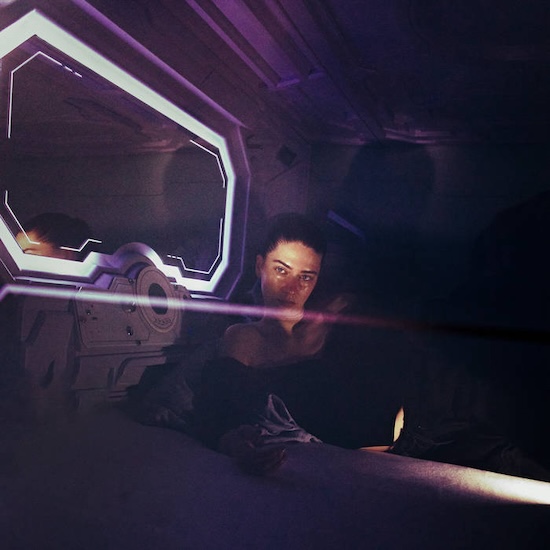There’s an elegance to the way that Berlin-based artist Franziska Aigner layers her voice on Heaven/Hell. What first sounds slight and off-the-cuff is full of depth and composure. It’s not easy to obscure yourself when your voice is so present, but she becomes a ghost haunting her own songs. That shadowy presentation makes for an intriguing listen, though one that’s occasionally difficult to pull a distinct emotion from.
This EP follows last year’s Styx, a bewitching listen that used cello loops, fragile piano and screeching racecars to take you to the edge of oblivion. Aigner’s background in both classical and contemporary composition could be heard in its weighty and surreal presentation. It’s an unsung gem, and well worth a listen.
Heaven/Hell operates less in this state of emotional emergency, instead shifting from weightlessness to cacophony, through the use of tough, staccato electronic beats. These two modes are blended impressively, and the mix of sounds carries a numbing and depressive palette. On the opener, ‘CLOUDS’, she references Visée’s ‘Prelude in A minor’, with an autotuned melody that sounds like a fallen angel plunging into darkness. As the song ends, stuttering shots of noise cut through the layers of voice and cello, like a violent disruption.
‘Contempt’ brings to mind the inversions of Reggaeton from Arca’s Kick series, with its netherworld sound palette and brutal approach to beat programming. That bombast doesn’t transfer lyrically or melodically, where Aigner’s minimal approach takes more time to sink in. “Paradise on mind / Come fly so high / Watch me unwind” she sings, underlining the closeness between salvation and deathwish. Her stark approach has purpose even if it doesn’t immediately connect.
After the semi-ambient vocalisations of ‘POWER’ she ends this tight offering with ‘CONTROL’, a desolate piano ballad that operates largely in the shadows. Aiger plays in bare arpeggios, like a dark-world version of Bach’s Prelude in C Major’. She returns to looking at the clouds, but they’re a warning sign of wind and rain this time. The song briefly opens up with swirling cello, the sun peaking through before darkness replaces it. In this barest moment in the collection, Aiger’s confidence is clear, though more light to balance out the shadow might allow the feeling to be read more clearly. “Everything is changing every other day”, she sings, before disappearing. We’ll be fools not to follow and see how she herself transforms in the years to come.


